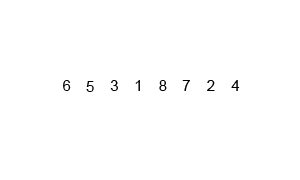Binary Tree - Level Order Traversal
Problem Statement Given a Binary tree, print out nodes in level order traversal…
May 17, 2019
This algorithm is very efficient one, and is classic example of Divide and Conquer algorithms.
In this algorithn, we divide the whole array into smaller sub-problems. i.e. till we get only single element. Single element means, there is no need to sort it. Lets call it sorted sub-array.
Next step is to merge two such sorted sub-array. The operation is called merge two sorted arrays.
As, the recursion stacks pops-up. We keeps on merging sorted sub-arrays. Untill all sub-arrays merged into one.
Finally we get the sorted array.
See the code here:
public void doMergeSort(int[] arr, int l, int r) {
if (l < r) {
int m = (r+l)/2;
doMergeSort(arr, l, m);
doMergeSort(arr, m+1, r);
merge(arr, l, m, r);
}
}
private void merge(int[] a, int l, int m, int r) {
int[] left = new int[m-l+1];
int[] right = new int[r-m];
for (int i=l; i<=m; i++) {
left[i-l] = a[i];
}
for (int i=m+1; i<=r; i++) {
right[i-m-1] = a[i];
}
int lindex = 0;
int rindex = 0;
for (int i=l; i<=r; i++) {
if (lindex < left.length && (rindex >= right.length || left[lindex] < right[rindex])) {
a[i] = left[lindex];
lindex ++;
}
else {
a[i] = right[rindex];
rindex ++;
}
}
}In above merge method, I have handled all cases in same loop. There is an alternate solution to this as well, see below:
public void merge2(int[] a, int l, int m, int r) {
int l1 = m-l+1;
int l2 = r-m;
int[] left = new int[l1];
int[] right = new int[l2];
for (int i=0; i<l1; i++) {
left[i] = a[l+i];
}
for (int i=0; i<l2; i++) {
right[i] = a[m+1+i];
}
int lindex = 0;
int rindex = 0;
int i=l;
while (lindex < l1 && rindex < l2) {
if (left[lindex] < right[rindex]) {
a[i] = left[lindex];
lindex++;
}
else {
a[i] = right[rindex];
rindex++;
}
i++;
}
//copy the leftover array
for (int j=lindex; j<l1; j++) {
a[i] = left[j];
i++;
}
for (int j=rindex; j<l2; j++) {
a[i] = right[j];
j++;
}
}
The algorithm runs on O(n log n) in worst/average case.
The merge function runs in O(n) time. Lets look at doMergeSort method which divides the input array. It divides the array into equal halves each time. First n/2, then (n/2)/2=n/4, then n/8, then n/16 and so on.
Which evaluates to log n So, total complexity of O(n log n)
Problem Statement Given a Binary tree, print out nodes in level order traversal…
Problem Statement Write a function that reverses a string. The input string is…
Problem The Leetcode file system keeps a log each time some user performs a…
Here are some tips while giving your coding interviews. 1. Never try to jump to…
Big-O notation In simpler terms, its kind of a unit to measure how efficient an…
Problem Statement Given a string, determine if it is a palindrome, considering…
Introduction In this post we will see following: How to schedule a job on cron…
Introduction There are some cases, where I need another git repository while…
Introduction In this post, we will see how to fetch multiple credentials and…
Introduction I have an automation script, that I want to run on different…
Introduction I had to write a CICD system for one of our project. I had to…
Introduction Java log4j has many ways to initialize and append the desired…